动词ing形式(动名词)的形式及用法
- 格式:doc
- 大小:46.00 KB
- 文档页数:18
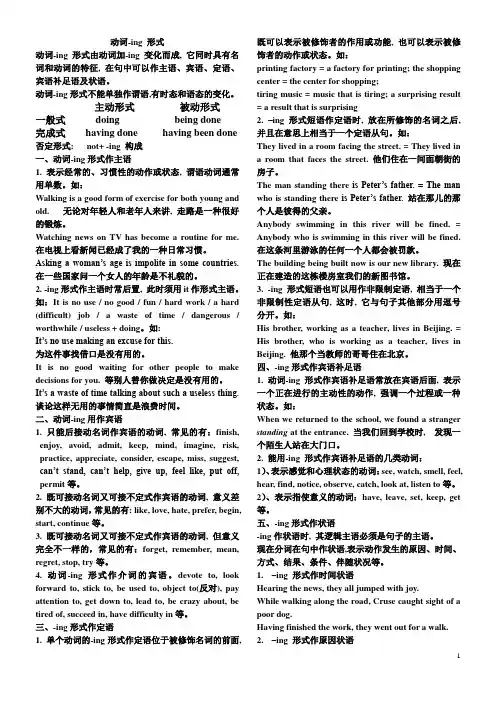
动词-ing 形式动词-ing形式由动词加-ing变化而成, 它同时具有名词和动词的特征, 在句中可以作主语、宾语、定语、宾语补足语及状语。
动词-ing形式不能单独作谓语,有时态和语态的变化。
主动形式被动形式一般式doing being done完成式having done having been done 否定形式: not+ -ing 构成一、动词-ing形式作主语1. 表示经常的、习惯性的动作或状态, 谓语动词通常用单数。
如:Walking is a good form of exercise for both young and old. 无论对年轻人和老年人来讲, 走路是一种很好的锻炼。
Watching news on TV has become a routine for me. 在电视上看新闻已经成了我的一种日常习惯。
Asking a woman’s age is impolite in some countries.在一些国家问一个女人的年龄是不礼貌的。
2. -ing形式作主语时常后置, 此时须用it作形式主语。
如:It is no use / no good / fun / hard work / a hard (difficult) job / a waste of time / dangerous / worthwhile / useless + doing。
如:It’s no use making an excuse for this.为这件事找借口是没有用的。
It is no good waiting for other people to make decisions for you. 等别人替你做决定是没有用的。
It’s a waste of time talking about such a useless thing. 谈论这样无用的事情简直是浪费时间。
二、动词-ing用作宾语1. 只能后接动名词作宾语的动词, 常见的有:finish, enjoy, avoid, admit, keep, mind, imagine, risk, practice, appreciate, consider, escape, miss, suggest, can’t stand, can’t help, give up, feel like, put off, permit等。

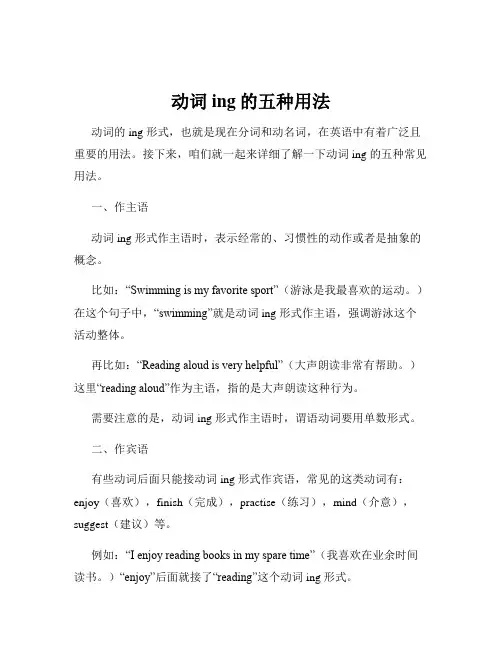
动词ing的五种用法动词的 ing 形式,也就是现在分词和动名词,在英语中有着广泛且重要的用法。
接下来,咱们就一起来详细了解一下动词 ing 的五种常见用法。
一、作主语动词 ing 形式作主语时,表示经常的、习惯性的动作或者是抽象的概念。
比如:“Swimming is my favorite sport”(游泳是我最喜欢的运动。
)在这个句子中,“swimming”就是动词 ing 形式作主语,强调游泳这个活动整体。
再比如:“Reading aloud is very helpful”(大声朗读非常有帮助。
)这里“reading aloud”作为主语,指的是大声朗读这种行为。
需要注意的是,动词 ing 形式作主语时,谓语动词要用单数形式。
二、作宾语有些动词后面只能接动词 ing 形式作宾语,常见的这类动词有:enjoy(喜欢),finish(完成),practise(练习),mind(介意),suggest(建议)等。
例如:“I enjoy reading books in my spare time”(我喜欢在业余时间读书。
)“enjoy”后面就接了“reading”这个动词 ing 形式。
“Have you finished doing your homework?”(你做完作业了吗?)“finish”后面接“doing”。
“Would you mind opening the window?”(你介意打开窗户吗?)“mind”接“opening”。
三、作表语动词 ing 形式作表语时,往往表示主语所具有的特征或性质。
例如:“The story is very interesting”(这个故事很有趣。
)“interesting”就是动词 ing 形式,用来描述“the story”的性质。
再比如:“His job is teaching English”(他的工作是教英语。
)“teaching English”作为表语,说明了他的工作内容。
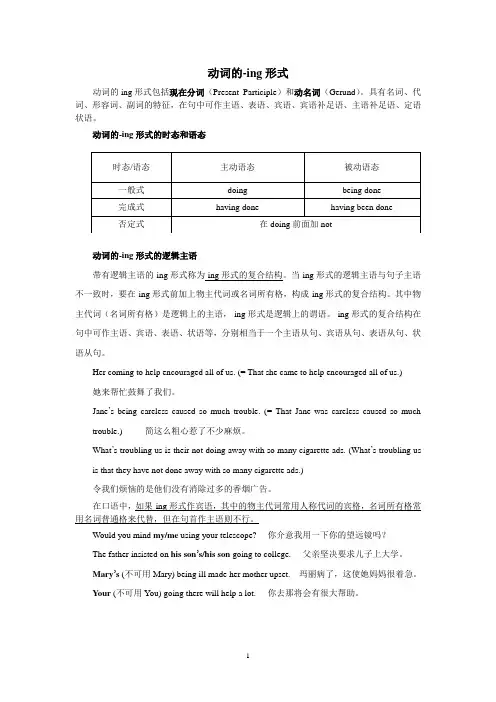
动词的-ing形式动词的ing形式包括现在分词(Present Participle)和动名词(Gerund)。
具有名词、代词、形容词、副词的特征,在句中可作主语、表语、宾语、宾语补足语、主语补足语、定语状语。
动词的-ing形式的时态和语态时态/语态主动语态被动语态一般式doing being done完成式having done having been done否定式在doing前面加not动词的-ing形式的逻辑主语带有逻辑主语的-ing形式称为-ing形式的复合结构。
当-ing形式的逻辑主语与句子主语不一致时,要在-ing形式前加上物主代词或名词所有格,构成-ing形式的复合结构。
其中物主代词(名词所有格)是逻辑上的主语,-ing形式是逻辑上的谓语。
-ing形式的复合结构在句中可作主语、宾语、表语、状语等,分别相当于一个主语从句、宾语从句、表语从句、状语从句。
Her coming to help encouraged all of us. (= That she came to help encouraged all of us.)她来帮忙鼓舞了我们。
Jane’s being careless caused so much trouble. (= That Jane was careless caused so much trouble.) 简这么粗心惹了不少麻烦。
What’s troubling us is their not doing away with so many cigarette ads. (What’s troubling us is that they have not done away with so many cigarette ads.)令我们烦恼的是他们没有消除过多的香烟广告。
在口语中,如果-ing形式作宾语,其中的物主代词常用人称代词的宾格,名词所有格常用名词普通格来代替,但在句首作主语则不行。
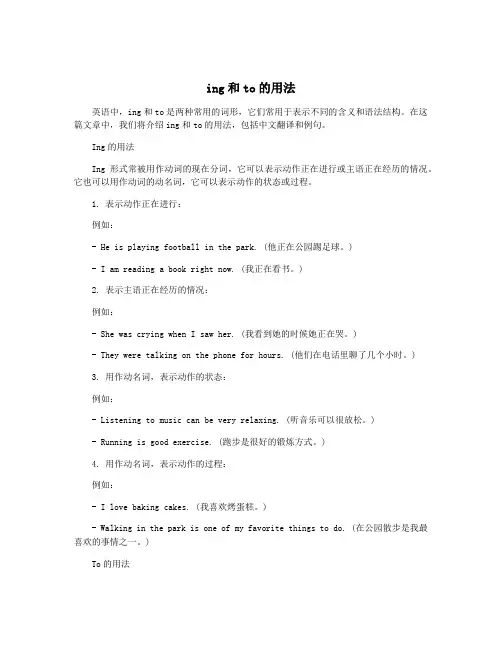
ing和to的用法英语中,ing和to是两种常用的词形,它们常用于表示不同的含义和语法结构。
在这篇文章中,我们将介绍ing和to的用法,包括中文翻译和例句。
Ing的用法Ing形式常被用作动词的现在分词,它可以表示动作正在进行或主语正在经历的情况。
它也可以用作动词的动名词,它可以表示动作的状态或过程。
1. 表示动作正在进行:例如:- He is playing football in the park. (他正在公园踢足球。
)- I am reading a book right now. (我正在看书。
)2. 表示主语正在经历的情况:例如:- She was crying when I saw her. (我看到她的时候她正在哭。
)- They were talking on the phone for hours. (他们在电话里聊了几个小时。
)3. 用作动名词,表示动作的状态:例如:- Listening to music can be very relaxing. (听音乐可以很放松。
)- Running is good exercise. (跑步是很好的锻炼方式。
)4. 用作动名词,表示动作的过程:例如:- I love baking cakes. (我喜欢烤蛋糕。
)- Walking in the park is one of my favorite things to do. (在公园散步是我最喜欢的事情之一。
)To的用法To可以用作介词、不定式符号和连词。
它可以表示方向,目的或结果,也可以用于表达动词不定式。
1. 用作介词,表示方向或目的:例如:- She went to the store to buy some vegetables. (她去商店买了些蔬菜。
)- I like to go to the park to play basketball. (我喜欢去公园打篮球。
)2. 用作连词,引导含有不定式的从句:例如:- I need to study more in order to pass the test. (我需要更多地学习才能通过考试。
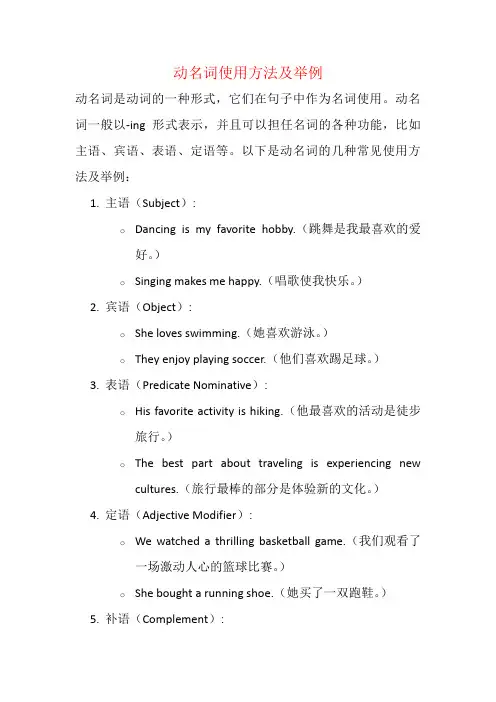
动名词使用方法及举例动名词是动词的一种形式,它们在句子中作为名词使用。
动名词一般以-ing形式表示,并且可以担任名词的各种功能,比如主语、宾语、表语、定语等。
以下是动名词的几种常见使用方法及举例:1.主语(Subject):o Dancing is my favorite hobby.(跳舞是我最喜欢的爱好。
)o Singing makes me happy.(唱歌使我快乐。
)2.宾语(Object):o She loves swimming.(她喜欢游泳。
)o They enjoy playing soccer.(他们喜欢踢足球。
)3.表语(Predicate Nominative):o His favorite activity is hiking.(他最喜欢的活动是徒步旅行。
)o The best part about traveling is experiencing new cultures.(旅行最棒的部分是体验新的文化。
)4.定语(Adjective Modifier):o We watched a thrilling basketball game.(我们观看了一场激动人心的篮球比赛。
)o She bought a running shoe.(她买了一双跑鞋。
)5.补语(Complement):o Her favorite activity is dancing.(她最喜欢的活动是跳舞。
)o The hardest part of studying is staying focused.(学习最困难的部分是保持专注。
)6.介词短语的一部分(Part of a Prepositional Phrase):o He is good at playing the guitar.(他擅长弹吉他。
)o They went for a walk after finishing dinner.(他们在晚饭后散步。
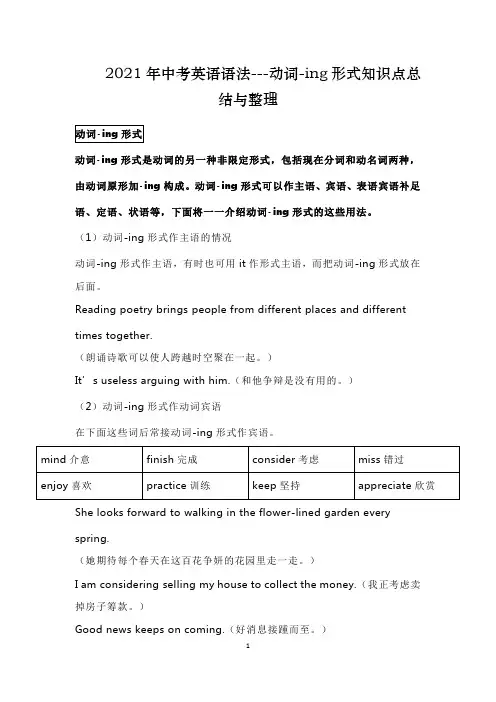
Having watered the vegetables (=After they had watered the vegetables),they went back home for breakfast.(他们浇过菜之后,就回家吃早饭了。
)B.动词-ing形式作状语表示原因Being so poor in those days (=As we were so poor in those days),we couldn’t afford to send the boy to the hospital.(由于那时太穷了,我们没有能力送孩子上医院。
)Having already seen the film twice (=As we had already seen the film twice),we didn’t go to the cinema.(因为这部电影我们已经看过两次了,所以我们没有去电影院。
)C.动词-ing形式作状语表示条件Standing on the top of the tower (=If we stand on the top of the tower),we can see as far as the Yangtze River.(如果我们站在塔顶上就能看到长江。
)D.动词-ing形式作状语表示自然而然的结果Her husband died in 1942,leaving five children with her (=and left five children with her).(1942年她丈夫死了,给她丢下5个孩子。
)E.动词-ing形式作状语表示伴随或补充说明Every evening they sat on the sofa watching TV (=and watched TV). (他们每天晚上坐在沙发上看电视。
)。

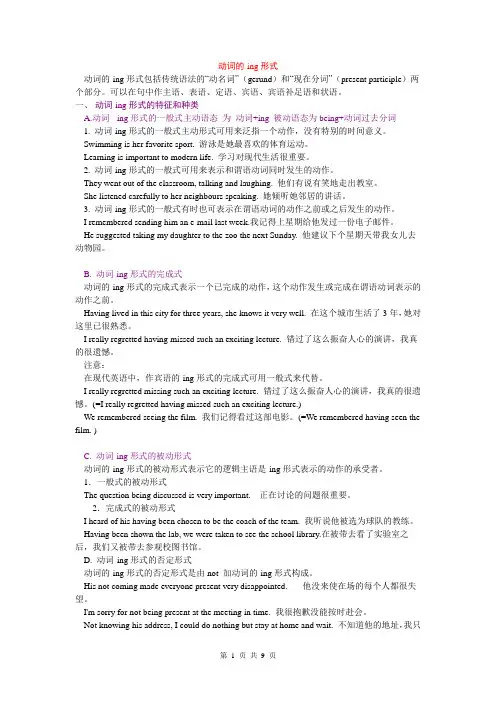
动词的-ing形式动词的-ing形式包括传统语法的“动名词”(gerund)和“现在分词”(present participle)两个部分。
可以在句中作主语、表语、定语、宾语、宾语补足语和状语。
一、动词-ing形式的特征和种类A.动词-ing形式的一般式主动语态为动词+ing 被动语态为being+动词过去分词1. 动词-ing形式的一般式主动形式可用来泛指一个动作,没有特别的时间意义。
Swimming is her favorite sport. 游泳是她最喜欢的体育运动。
Learning is important to modern life. 学习对现代生活很重要。
2. 动词-ing形式的一般式可用来表示和谓语动词同时发生的动作。
They went out of the classroom, talking and laughing. 他们有说有笑地走出教室。
She listened carefully to her neighbours speaking. 她倾听她邻居的讲话。
3. 动词-ing形式的一般式有时也可表示在谓语动词的动作之前或之后发生的动作。
I remembered sending him an e-mail last week.我记得上星期给他发过一份电子邮件。
He suggested taking my daughter to the zoo the next Sunday. 他建议下个星期天带我女儿去动物园。
B. 动词-ing形式的完成式动词的-ing形式的完成式表示一个已完成的动作,这个动作发生或完成在谓语动词表示的动作之前。
Having lived in this city for three years, she knows it very well. 在这个城市生活了3年,她对这里已很熟悉。
I really regretted having missed such an exciting lecture. 错过了这么振奋人心的演讲,我真的很遗憾。
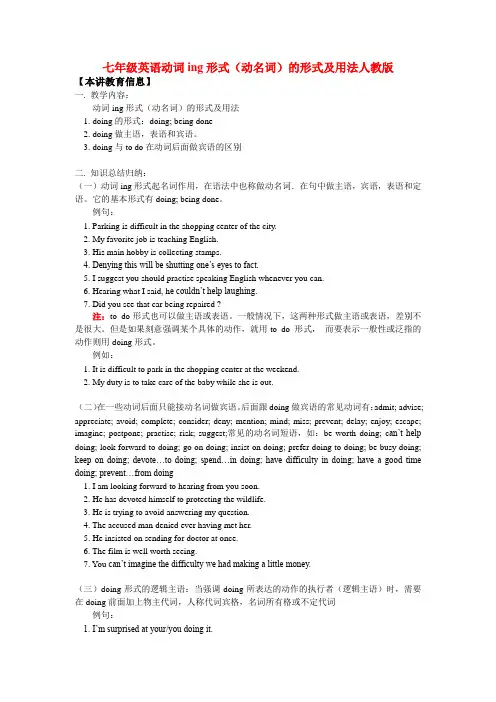
七年级英语动词ing形式(动名词)的形式及用法人教版【本讲教育信息】一. 教学内容:动词ing形式(动名词)的形式及用法1. doing的形式:doing; being done2. doing做主语,表语和宾语。
3. doing与to do在动词后面做宾语的区别二. 知识总结归纳:(一)动词ing形式起名词作用,在语法中也称做动名词.在句中做主语,宾语,表语和定语。
它的基本形式有doing; being done。
例句:1. Parking is difficult in the shopping center of the city.2. My favorite job is teaching English.3. His main hobby is collecting stamps.4. Denying this will be shutting one’s eyes to fact.5. I suggest you should practise speaking English whenever you can.6. Hearing what I said, h e couldn’t help laughing.7. Did you see that car being repaired ?注:to do形式也可以做主语或表语。
一般情况下,这两种形式做主语或表语,差别不是很大。
但是如果刻意强调某个具体的动作,就用to do 形式,而要表示一般性或泛指的动作则用doing形式。
例如:1. It is difficult to park in the shopping center at the weekend.2. My duty is to take care of the baby while she is out.(二)在一些动词后面只能接动名词做宾语。
后面跟doing做宾语的常见动词有:admit; advise; appreciate; avoid; complete; consider; deny; mention; mind; miss; prevent; delay; enjoy; escape; imagine; postpone; practise; risk; suggest;常见的动名词短语,如:be worth doing; c an’t help doing; look forward to doing; go on doing; insist on doing; prefer doing to doing; be busy doing; keep on doing; devote…to doing; spend…in doing; have difficulty in doing; have a good time doing; prevent…from doing1. I am looking forward to hearing from you soon.2. He has devoted himself to protecting the wildlife.3. He is trying to avoid answering my question.4. The accused man denied ever having met her.5. He insisted on sending for doctor at once.6. The film is well worth seeing.7. You can’t imagine the difficulty we had making a little money.(三)doing形式的逻辑主语:当强调doing所表达的动作的执行者(逻辑主语)时,需要在doing前面加上物主代词,人称代词宾格,名词所有格或不定代词例句:1. I’m surprised at your/you doing it.2. She insisted on their both accepting the invitation.3. Do you mind my opening the window ?4. Your being right doesn’t necessarily mean my being wrong.5. The children are looking forward to spring coming.6. He disapproved of that being said about Jane.7. Mr. Carson complained about Tom and Mary coming to class late.(四)doing与to do在动词后面做宾语的区别:remember/forget to do:记住/忘记了去做某事Don’t forget to do sth.=remember to do sth.regret to do: 遗憾地去做/说regret doing: 后悔做了某事mean to do= want to do mean doing 意味着做stop to do: 停下来去做stop doing 停止/不去做try to do: 试图/努力/企图去做try doing: 尝试用一种方法做go on to do 接着去做另一件事go on doing: 继续把事情做下去例句:1. Don’t forget to mail this letter tomorrow morning.2. I don’t remember having said anything of the sort.3. I regret to say that you have failed in the exam.4. He tried to walk without a crutch.5. He went on to tell us about the accident.【典型例题】一. 单项选择:1. While shopping, people sometimes can’t help ____ into buy something they don’t really need.A. to persuadeB. persuadingC. being persuadedD. be persuaded分析:题意为:进店购物,人们有时不得不被购买不想买的东西。

你知道ing的用法吗?快来一起学习吧,下面小编就和大家分享,来欣赏一下吧。
动词-ing动名词用法非谓语动词ing用法一、结构:动词+ing构成。
二、动词-ing包括现在分词和动名词1. 现在分词通常用作V. 或adj.She is watching TV. 她正在看电视。
(用作V.)He was playing basketball. 他正在打篮球。
(用作V.)The news is very exciting. 这消息很振奋人心。
(用作adj.)The story is interesting. 这故事有趣。
(用作adj)2.动名词常作n.Fishing is a sport. 钓鱼是一种运动。
Her hobby is playing chess. 她的爱好是玩象棋。
She enjoys swimming. 她喜欢游泳。
现在重点讲动名词用法动名词句法功能若不清楚什么是主语宾语谓语表语等,请查看本公众号下方菜单“语法视频”中有详细解析。
1.作主语表示一件事,谓语动词用单数。
Smoking is bad for health. 吸烟有害健康。
Listening to music is one way to relax. 听音乐是放松的一种方式。
Cooking is one of my hobbies. 烹饪是我的爱好之一。
常用it作形式主语,把真正的主语动名词放在后面。
It was a waste of time reading that book.看那本书就是浪费时间。
2.做宾语1)动词+v-ing:She doesn’t like singing. 她不喜欢唱歌。
I suggest going for a walk. 我建议去走走。
She loved playing guitar. 她喜欢弹吉他。
.常接动名词作宾语的动词有:advise, avoid, consider, enjoy, feel like, finish, inagine, keep, mind, practice, sugger等。
动词的-ing形式1、概述动词的-ing形式包括了传统语法中所说的动名词(gerund)和现在分词(present participle)。
所有行为动词都有-ing形式。
情态动词和助动词(除be,have 外)没有动名词形式。
动词的-ing形式仍保留有动词的许多特征,可以有自己的逻辑主语、宾语、状语。
动词的-ing形式连同其后面的宾语或状语,一起构成了动词的-ing形式短语。
同时动词的-ing形式词又具有名词、形容词、副词的特性,可以在句中充当主语、宾语、表语、定语、宾语补足语和状语等成分。
2、动词的-ing形式时态与语态动词的-ing形式有主动和被动两种语态,也有一般式、完成式和完成进行式之①一般式一般式所表示的动作或状态与谓语动词所表示的动作或状态几乎同时发生或发生在谓语动词之后。
I enjoy learning English.我喜欢学英语。
My wife hates smoking.我妻了憎恨抽烟。
I saw them playing under a big tree.看见他们正在大树下玩。
(同时)Working hard,you'll be successful.努力工作你就会成功。
(稍前)We met an accident, causing the delay.我们遇到了车祸,所以晚了。
(稍后)②完成式完成式所表示的动作发生在谓语动词所表示的动作之前。
She didn't remember having met him before. 她不记得从前见过他了。
Not having received a reply, he decided to write again. 没有收到回信,他决定再写一封。
Having finished my work, I sat down to have a rest. 完成了工作之后,我坐下来休息。
Having been there many times, I know the city very much.我去过那儿多次,所以我很了解该市。
第6章动词的-ing形式动词的-ing形式包括传统语法的“动名词”(gerund)和“现在分词”(present participle)两个部分。
动词的-ing形式具有动词的特征,同时又具有名词、形容词和副词的特征,因此它可以在句中作主语、表语、定语、宾语、宾语补足语和状语。
一、动词-ing形式的特征和种类与动词不定式一样,动词的-ing形式也具有动词的特征,有时态和语态的变化,并可带状语、宾语等。
A.动词-ing形式的一般式1. 动词-ing形式的一般式可用来泛指一个动作,没有特别的时间意义。
Swimming is her favorite sport. 游泳是她最喜欢的体育运动。
Learning is important to modern life. 学习对现代生活很重要。
2. 动词-ing形式的一般式可用来表示和谓语动词同时发生的动作。
They went out of the classroom, talking and laughing. 他们有说有笑地走出教室。
She listened carefully to her neighbours speaking. 她倾听她邻居的讲话。
3. 动词-ing形式的一般式有时也可表示在谓语动词的动作之前或之后发生的动作。
I remembered sending him an e-mail last week.我记得上星期给他发过一份电子邮件。
He suggested taking my daughter to the zoo the next Sunday. 他建议下个星期天带我女儿去动物园。
B. 动词-ing形式的完成式动词的-ing形式的完成式表示一个已完成的动作,这个动作发生或完成在谓语动词表示的动作之前。
Having lived in this city for three years, she knows it very well. 在这个城市生活了3年,她对这里已很熟悉。
动词ing知识点总结动词ing形式,在英文语法中是一种非常重要的形式,它有多种不同的用法和功能。
在本篇文章中,我们将深入探讨动词ing形式的各种用法和知识点,帮助读者更好地掌握和使用这一语法结构。
一、动词ing形式的基本构成动词ing形式的构成非常简单,大多数情况下是在动词原形的基础上加上ing后缀。
例如:- walk → walking- eat → eating- play → playing但是也有一些特殊的变化规则,比如以“e”结尾的动词要去掉最后的“e”再加上ing,比如:- take → taking- make → making- write → writing还有一些以辅音字母加“ie”结尾的动词,要将“ie”变为“y”再加上ing,比如:- die → dying- lie → lying总的来说,动词ing形式的构成规则比较简单,但需要注意一些特殊变化规则。
二、动词ing的用法动词ing形式具有多种不同的用法和功能,下面将详细介绍每一种用法。
1. 动词ing 作谓语动词动词ing形式可以作为谓语动词,表示正在进行的动作。
例如:- He is reading a book.- They are playing basketball.2. 动词ing 作动名词动词ing形式也可以作为名词使用,这就是动名词。
动名词可以作为主语、宾语、表语、介词宾语等。
例如:- Swimming is good exercise.- I enjoy reading novels.- She is good at singing.3. 动词ing 作形容词动词ing形式还可以作为形容词使用,表示给人或物的特征或状态。
例如:- The movie was boring.- The running water sounds soothing.4. 动词ing 用于进行时态在进行时态中,动词ing形式表示正在进行的动作。
动名词用法及例句动名词是以-ing结尾的动词形式,在句子中可作为主语、宾语、表语、定语等。
下面是一些动名词的用法及相应的例句:1. 作为主语:- Swimming is my favorite sport.(游泳是我最喜欢的运动。
)- Singing in the shower is my morning routine.(在淋浴时唱歌是我早上的习惯。
)2. 作为宾语:- I enjoy playing soccer with my friends.(我喜欢和朋友们一起踢足球。
)- He hates studying for long hours.(他讨厌长时间学习。
)3. 作为表语:- Her hobby is cooking.(她的爱好是烹饪。
)- The best thing about traveling is experiencing different cultures.(旅行最美妙之处在于体验不同的文化。
)4. 作为定语:- I saw a running dog in the park.(我在公园里看到一只跑的狗。
)- She bought a cycling helmet for her son.(她为儿子买了一个骑车头盔。
)5. 作为动词不定式的替代形式:- I want to go to the movies.(我想去看电影。
)- I want going to the movies.(我喜欢看电影。
)需要注意的是,在某些情况下,动名词也可用来表示动作的结果或持续状态,这时常与be动词连用,例如:- The car needs washing.(这辆车需要洗。
)- He was seen dancing at the party.(他在派对上被看到正在跳舞。
)。
动词ing形式(动名词)的形式及用法【本讲教育信息】一. 教学内容:动词ing形式(动名词)的形式及用法1. doing的形式:doing; being done2. doing做主语,表语和宾语。
3. doing与to do在动词后面做宾语的区别二. 知识总结归纳:(一)动词ing形式起名词作用,在语法中也称做动名词.在句中做主语,宾语,表语和定语。
它的基本形式有doing; being done。
例句:1. Parking is difficult in the shopping center of the city.2. My favorite job is teaching English.3. His main hobby is collecting stamps.4. Denying this will be shutting one’s eyes to fact.5. I suggest you should practise speaking English whenever you can.6. Hearing what I said, he couldn’t help laughing.7. Did you see that car being repaired ?注:to do形式也可以做主语或表语。
一般情况下,这两种形式做主语或表语,差别不是很大。
但是如果刻意强调某个具体的动作,就用to do 形式,而要表示一般性或泛指的动作则用doing形式。
例如:1. It is difficult to park in the shopping center at the weekend.2. My duty is to take care of the baby while she is out.(二)在一些动词后面只能接动名词做宾语。
后面跟doing 做宾语的常见动词有:admit; advise; appreciate; avoid; complete; consider; deny; mention; mind; miss; prevent; delay; enjoy; escape; imagine; postpone; practise; risk; suggest;常见的动名词短语,如:be worth doing; can’t help doing; look forward to doing; go on doing; insist on doing; prefer doing to doing; be busy doing; keep on doing; devote…to doing; spend…in doing; have difficulty in doing; have a good time doing; prevent…from doing1. I am looking forward to hearing from you soon.2. He has devoted himself to protecting the wildlife.3. He is trying to avoid answering my question.4. The accused man denied ever having met her.5. He insisted on sending for doctor at once.6. The film is well worth seeing.7. You can’t imagine the difficulty we had making a little money.(三)doing形式的逻辑主语:当强调doing所表达的动作的执行者(逻辑主语)时,需要在doing前面加上物主代词,人称代词宾格,名词所有格或不定代词例句:1. I’m surprised at your/you doing it.2. She insisted on their both accepting the invitation.3. Do you mind my opening the window ?4. Your being right doesn’t necessarily mean my being wrong.5. The children are looking forward to spring coming.6. He disapproved of that being said about Jane.7. Mr. Carson complained about Tom and Mary coming to class late.(四)doing与to do在动词后面做宾语的区别: remember/forget to do:记住/忘记了去做某事Don’t forget to do sth.=remember to do sth.regret to do: 遗憾地去做/说regretdoing: 后悔做了某事mean to do= want to do mean doing 意味着做stop to do: 停下来去做stop doing 停止/不去做try to do: 试图/努力/企图去做try doing: 尝试用一种方法做go on to do 接着去做另一件事go on doing: 继续把事情做下去例句:1. Don’t forget to mail this letter tomorrow morning.2. I don’t remember having said anything of the sort.3. I regret to say that you have failed in the exam.4. He tried to walk without a crutch.5. He went on to tell us about the accident.【典型例题】一. 单项选择:1. While shopping, people sometimes can’t help ____ into buy something they don’t really need.A. to persuadeB. persuadingC. being persuadedD. be persuaded分析:题意为:进店购物,人们有时不得不被购买不想买的东西。
can’t help doing 不得不,禁不住做某事。
主语people与persuade为被动关系,所以应用being done。
答案:C2. In some parts of London, missing a bus means ____ for another hour.A. waitingB. to waitC. waitD. to be waiting分析:根据句意:错过一班车意味着要再等上一个小时。
意味着作某事:mean doing。
答案:A3. How many of us_____, say, a meeting that is not important to us would be interested in the discussion?A. attendedB. attendingC. to attendD. have attended分析:根据句意:比如说,我们当中参加一个对我们毫不重要的会议的人会有多少人对这个讨论感兴趣呢?us_____, say, a meeting that is not important to us作为动名词短语做of 的宾语。
答案:B4. —What should I do with this passage ?—___ the main idea of each paragraph.A. Finding outB. Found outC. Find outD. To find out分析:问句中should用与征求建议,答语中应当是祈使句语气提出要求。
答案:C5. I can’t understand ___ her like that.A. you treat B, you to treat C. why treat D. you treating分析:understand后面接动名词做宾语.you为动名词treating 的逻辑主语。
答案:D6. He got well-prepared for the job interview, for hecouldn’t risk __ the good opportunity.A. to loseB. losingC. to be lostD. being lost分析:risk后面跟动名词做宾语。
答案:B二. 短文改错:1. Shake her head, she said, “ It isn’t a good time to do that, dear.”分析:根据句意,shake her head 为后一句的伴随状语,答案:Shake 应改为Shaking2. It’s like going to a huge library without have to walk around to find.分析:without是介词,后面应接doing形式。
答案:have 应改为having3. Having a pleasant trip and see you Friday.分析:根据句意,本句是祈使句,答案:Having应改为Have4. Soon I began to enjoy talk to myself onpaper……分析:enjoy后面跟doing形式答案:talk 应改为talking【模拟试题】(答题时间:60分钟)一. 单项选择:1. Don’t you think the question _____ at the moment is of great importance.A. being discussedB. discussedC. to be discussedD. to discuss2. The food _____ at the moment is for the dinner party.A. cookedB. to be cookedC. is being cookedD. being cooked3 . When asked by the police, he said that he remembered ___ at the party, but not ____.A. to arrive; leavingB. to arrive; to leaveC. arriving; leavingD. arriving; to leave4. I really appreciate ____ to relax with you on this island.A. to have had timeB. having timeC. to have timeD. to having time5. Mr. Reed made up his mind to devote all he had to _ _ some schools for poor children.A. set upB. setting upC. have set upD. having set up6. The man insist ____ a taxi for me even though I told him I lived nearby.A. findB. to findC. on findingD. in finding7. There’s a man at the reception desk who seems very angry and I think he means __ trouble.A. makingB. to makeC. to have madeD. having made8. As I will be away for at least a year, I’d appreciate____ from you now and then ___ me how everyone is getting along.A. hearing; tellB. to hear; tellC. hearing; tellingD. to hear; to tell二. 完型填空:More than forty thousand readers told us what they looked for in close friendship, what they expected 1 friends, what they were willing to give in 2 , and how satisfied they were 3 the quality of their friendships. The 4 give little comfort to social critics . Friendship 5 to be a different form of 6 relationships. Unlike marriage or the ties that 7 parents and children, it is not explained or regulated by 8 . Unlike other social roles that we are expected to 9 –as citizens, employees, members of professional societies and 10 organizations –it has its own rule, which is to develop 11 of warmth, trust and love 12 two people. The 13 on friendships appeared in Psychology Today in March. The findings 14 that topics of trust and betrayal are 15 tofriendship. They also suggest thatour readers do not 16 for friends only among those who are 17 like them, but find many 18 differ in race, religion, and background. Arguably the most important 19 that appears in the article, 20 , is not something that we found--but what wedid not.1. A. on B. of C. toD. for2. A. addition B. payC. turnD. return3. A. about B. of C. withD. by4. A. results B. effects C. expectations D. ends5. A. feels B. leads C. sounds D. appears6. A. human B. mankind C. their D. civil7. A. join B. relate C. control D. attract8. A. force B. law C. rule D. order9. A. keep B. do C. show D.play10. A. all B. any C. other D. those11. A. friendship B. interests C. feelings D. relations12. A. between B. on C. in D. for13. A. book B. article C. description D. wish14. A. warn B. believe C. prove D. solve15. A. true B. main C. falseD. central16. A. ask B. call C. care D. look17. A. most B. more C. least D. less18. A. people B. who C. what D. friends19. A. conclusion B. summary C. decision D. demand20. A. moreover B. however C. still D. yet三. 阅读理解:We are all familiar with domestic trade. When I buy Florida oranges or California shirts, I naturally want to pay in dollars. Luckily. the orange grower and the shirt manufacturer are willing to accept U.S. dollars for their expenses. Trade can be carried on in dollars. Economic transactions within a country are relatively simple.If I want to buy a British bicycle, however, matters become more complicated. I must ultimately pay in British money, or "British pounds,” rather than in dollars. Similarly, if the British want to buy U.S. merchandise, they must obtain U. S. dollars. And the requirement to obtain foreign currencies bolds for other countries as well.We see, then, that international trade introduces a new element: the foreign exchange rate, which denotes the price of a foreign country's currency in terms of our own.Here are some examples: The U. S. dollar price of a British pound was recently $ I. 80; for a British resident wanting to buy U. S. goods, the price of a dollar was ?1/$1.80= ?0.56. There is also a foreign exchange rate between U. S. dollars and the currency of each and every country, In mid—1988, the foreign exchange rate was 60 cents for a German mark, 18 cents for aFrench franc, 80 cents for a Canadian dollar, and 0. 8 cent for a Japanese yen. For foreigners desiring to buy dollars, the reciprocal prices were 1. 67 German marks. 5. 56 French francs, 1.25 Canadian dollars, or 125 Japanese yen for each U.S. dollar. Given the foreign exchange rate, it is now possible for me to buy my English bicycle. Suppose its quoted price is , ?100(i.e. , 100 British pounds). All I have to do is look in the newspaper for the foreign exchange rate for pounds. If this is $1.80 per pound, I simply go to a bank with $180 and ask that the money be used to pay the English bicycle exporter. Pay with what? The bank pays with pounds, of course, the kind of money the exporter needs.You should be able to show what British importers of American grain have to do if they want to buy, say a $ 36,000 shipment from an American exporter. Here pounds must be converted into dollars. You will see that, when the foreign exchange rate is $1.80 per pound, the grain shipment costs them ?20,000. Businesses and tourists do not have to know anything more than this for their import or export transactions. But the true economics of foreign exchange rates cannot be grasped until we find out why the foreign exchange rate is at a given level.1. It can be inferred that the writer is .A. British.B. American.C. Chinese.D. French.2. What is meant by the third paragraph?A. The foreign exchange rate is an element coming with international trade dealing with foreign countries’ currency.B. International trade introduces the clement of the foreign exchange rate indicating a foreign currency at our own priceC. The foreign exchange rate is a new element in international trade indicating the price of a country's currency in terms of the price of another country's currency.D. The foreign exchange rate is an element introduced to denote the price of a foreign currency in terms of the price of another foreign currency.3. In mid—1988, how much dollars did one have to have in order to exchange for 10,000,000 Japanese yen?A. 8,000,000B. 80,000C. 800,000D. 80,000,0004. What do British importers have to do if they want to buy$ 36,000 worth of grain from an American exporter?A. They have to pay British pounds directly.B. They have to pay French francs.C. They have to convert 36,000 U.S. dollars into 20,000 Britishpounds.D. They have to convert 20,000 British pounds into 36,000 U.S. dollars.5. The last paragraph implies that businesses and touristsA. do not have to know the true economies of foreign exchange rates.B. do not have to know more the true economics of foreign exchange rates.C. have to know nothing more than economics of foreign exchange rates.D. do not have to grasp the true economics of foreign exchange rates at a given level. 【试题答案】一. 单项选择:1. A the question _____ at the moment指此刻正在被讨论的问题。